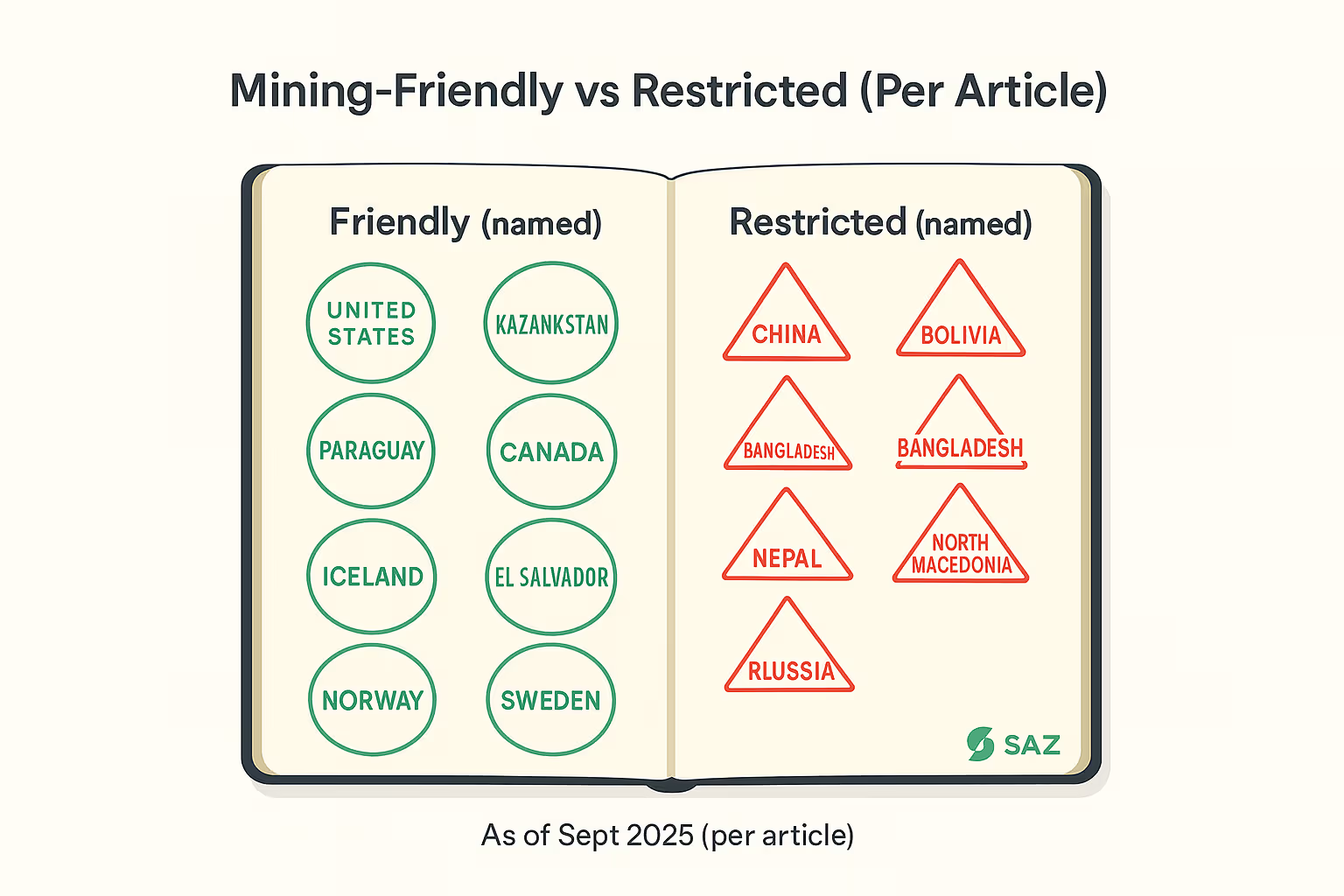
The Bitcoin mining industry operates in a complex web of international regulations, with laws varying dramatically from country to country. As governments worldwide grapple with the environmental, economic, and regulatory implications of Bitcoin mining, miners face an increasingly challenging landscape of legal restrictions, outright bans, and evolving compliance requirements.
Understanding where mining is legal—and how to navigate restrictions in your region—has become crucial for anyone serious about Bitcoin mining in 2025.
The Current Global Legal Landscape
The legal status of cryptocurrencies varies substantially from one jurisdiction to another, and is still undefined or changing in many of them, creating a constantly shifting regulatory environment that miners must carefully navigate. While some countries have embraced mining as a legitimate business activity, others have implemented strict bans or created regulatory frameworks so complex that compliance becomes nearly impossible for individual miners.
The regulatory approach generally falls into several categories: countries that fully embrace mining, those with clear but restrictive regulations, jurisdictions with unclear or evolving laws, and nations that have implemented complete bans.
Thinking through these risks is a must before investing capital in Bitcoin mining equipment and operations.
Countries Where Mining is Prohibited or Severely Restricted
China: The Great Mining Exodus
China enforces a full bitcoin & crypto ban, ending private ownership and trading to promote its digital yuan and centralize financial control. This represents one of the most significant regulatory shifts in mining history, as China was previously home to the majority of global Bitcoin mining operations.
The Chinese ban has had far-reaching implications beyond just domestic miners.
Despite imposing a blanket ban on cryptocurrencies back in 2021, reports suggest that China still controls 55% of the Bitcoin network's hashrate, indicating that mining operations have moved underground or relocated to other jurisdictions while maintaining Chinese ownership or control.
Other Restrictive Jurisdictions
Crypto bans persist in countries like China, Egypt, and Algeria due to financial risks and regulations. These countries cite various concerns including financial stability, energy consumption, environmental impact, and the potential for cryptocurrencies to undermine traditional monetary systems.
Several other nations maintain restrictive or ambiguous positions on mining:
- Egypt has implemented strict cryptocurrency regulations that effectively prohibit mining operations, citing concerns about energy consumption and financial stability.
- Algeria maintains a complete ban on cryptocurrency activities, including mining, with severe penalties for violations.
- Bolivia continues to prohibit cryptocurrency activities, though enforcement varies by region.
- Nepal has banned cryptocurrency trading and mining, though recent discussions suggest potential policy changes.
- Bangladesh maintains strict prohibitions on cryptocurrency activities, including mining operations.
- North Macedonia has banned cryptocurrency mining due to energy concerns and grid stability issues.
Mining-Friendly Jurisdictions: Where Operations Thrive
Despite restrictions in some regions, many countries actively welcome cryptocurrency mining operations, recognizing the economic benefits and technological innovation they bring.
United States: The New Mining Capital
Following China's exodus, the United States has emerged as the world's largest Bitcoin mining hub, with states competing to attract mining operations through favorable regulations and energy policies. States like Texas, Wyoming, and North Dakota have implemented crypto-friendly legislation and offer access to cheap energy sources.
Canada: Northern Advantages
Canada offers several advantages for mining operations, including:
- Abundant renewable energy sources
- Cool climate reducing cooling costs
- Generally supportive regulatory environment
- Stable political and economic conditions
Kazakhstan: Central Asian Hub
Kazakhstan quickly became a major mining destination post-China ban, offering:
- Low electricity costs
- Established mining infrastructure
- Relatively straightforward regulatory framework
Nordic Countries: Sustainable Mining
Iceland, Sweden and Norway have become popular destinations for environmentally conscious miners:
- Access to cheap, renewable geothermal and hydroelectric power
- Cool climate reducing cooling costs
- Stable regulatory environment
- Strong internet infrastructure
Other Mining-Friendly Regions
- Russia maintains a complex but generally permissive approach to mining, with specific regions actively courting mining operations.
- Paraguay offers some of the world's cheapest electricity rates and has emerged as a significant mining destination.
- El Salvador made international headlines by adopting Bitcoin as legal tender and actively promoting mining operations using volcanic geothermal energy.
Environmental and Energy Considerations
Countries are realizing that energy-intensive Bitcoin mining brings serious environmental and economic risks and are taking steps to limit the industry. This environmental concern has become a central factor in mining regulations worldwide.
Many jurisdictions now differentiate between mining operations based on their energy sources:
- Renewable Energy Priority: Countries like Norway and Iceland actively promote mining operations that use renewable energy sources, viewing them as beneficial to their energy sectors.
- Grid Stability Concerns: Some regions have restricted mining during peak energy demand periods or required miners to participate in demand response programs.
- Carbon Footprint Regulations: Several jurisdictions are implementing carbon reporting requirements or carbon taxes specifically targeting energy-intensive industries like mining.
The Regulatory Evolution: Changing Landscapes
The legal landscape for cryptocurrency mining continues to evolve rapidly. Some others are shifting their views regarding cryptocurrency regulations, with several countries reconsidering previous restrictions as they better understand the technology and its potential benefits.
Recent regulatory trends include:
- Licensing Requirements: More jurisdictions are implementing formal licensing procedures for mining operations, providing clarity but adding compliance costs.
- Environmental Standards: New regulations often include specific environmental requirements or incentives for sustainable mining practices.
- Tax Frameworks: Countries are developing specific tax treatments for mining operations, ranging from favorable to prohibitive rates.
- Grid Integration: Some regions now require miners to participate in grid stabilization programs or demand response initiatives.
Why Mining Hosting Services Are Your Solution
When mining is restricted, banned, or economically unviable in your region, professional mining hosting services like Sazmining offer a legal and practical solution that allows you to participate in cryptocurrency mining regardless of your local restrictions and local startup costs.
Legal Compliance Made Simple
Mining hosting services operate in jurisdictions where mining is fully legal and regulated, ensuring complete compliance with all applicable laws. This removes the legal risk and uncertainty that individual miners face when operating in gray areas or jurisdictions with unclear regulations.
Sazmining's Global Approach: Sazmining operates facilities in Paraguay and Norway—both mining-friendly jurisdictions with clear legal frameworks and supportive government policies. This geographic diversification provides additional security and regulatory stability for customers.
Bypassing Local Restrictions
If your country has banned or restricted mining operations, hosting services allow you to legally participate in mining through facilities located in permissive jurisdictions. You own the mining equipment, but it operates in a location where mining is fully legal and supported.
Key Benefits:
- No risk of legal violations in your home country
- Access to professional facilities in mining-friendly jurisdictions
- Compliance with international best practices
- Transparent reporting for tax purposes
Avoiding Infrastructure Challenges
Even in countries where mining is legal, local infrastructure limitations, high electricity costs, or grid instability can make home mining impractical or unprofitable. Hosting services solve these challenges by providing:
- Professional Infrastructure: Enterprise-grade power, cooling, and internet connectivity designed specifically for mining operations.
- Cheap, Clean Energy: Access to wholesale electricity rates and renewable energy sources that would be impossible to obtain individually.
- Expert Maintenance: Professional staff handle all technical issues, repairs, and optimization without requiring your involvement.
Sazmining: A Model for Compliant International Mining
Sazmining exemplifies how hosting services can provide compliant mining solutions regardless of your location:
- Paraguay Operations: Operating in a jurisdiction with some of the world's cheapest electricity rates (4.7¢/kWh) and a government supportive of cryptocurrency mining.
- Norway Facility: Utilizing 99% carbon-free energy in one of the world's most environmentally progressive countries, providing sustainable mining solutions that align with global environmental goals.
- Regulatory Expertise: Professional compliance with all local regulations, tax requirements, and reporting obligations in their operating jurisdictions.
- International Accessibility: Customers from around the world can participate in legal mining operations regardless of their home country's restrictions.
Risk Management Through Geographic Diversification
Professional hosting services also provide important risk management benefits through geographic diversification. Political changes, regulatory shifts, or economic instability in any single country can threaten mining operations, but hosting services can spread these risks across multiple stable jurisdictions.
Sazmining's Strategy: By operating in both South America (Paraguay) and Europe (Norway), Sazmining provides customers with exposure to different regulatory environments, energy markets, and economic conditions, reducing the risk associated with any single jurisdiction.
Tax and Compliance Advantages
Hosting services often provide significant advantages for tax planning and compliance:
- Clear Documentation: Professional hosting facilities provide detailed records of mining activities, energy consumption, and rewards that simplify tax reporting.
- Jurisdictional Benefits: Some hosting locations offer favorable tax treatments for mining activities or international business structures.
- Compliance Expertise: Professional services understand the complex international tax and regulatory requirements that individual miners often struggle to navigate.
Future-Proofing Your Mining Operations
The regulatory landscape for Bitcoin mining will continue to change, either for the positive or negative, and hosting services provide protection against that uncertainty and future changes:
- Regulatory Monitoring: Professional services stay current with changing regulations and adapt operations accordingly.
- Operational Flexibility: If regulations change in one jurisdiction, reputable hosting services can potentially relocate operations or adjust strategies.
- Technology Evolution: Hosting facilities invest in infrastructure upgrades and new technologies that individual miners would struggle to implement.
Making the Right Choice for Your Situation
Whether mining hosting services are right for you depends on several factors:
Consider Hosting Services If:
- Mining is banned or restricted in your region
- Local electricity costs make home mining unprofitable
- You lack adequate infrastructure for mining operations
- You want professional management and maintenance
- You're concerned about regulatory compliance
- You value environmental sustainability
Evaluate Carefully:
- Compare hosting fees to potential mining profits
- Research the reputation and track record of hosting services
- Understand the terms and conditions of hosting agreements
- Consider the tax implications in both your jurisdiction and the hosting location
Navigating Global Mining Regulations
The global Bitcoin mining landscape in 2025 presents both challenges and opportunities. While some countries have implemented restrictions or bans, many others actively welcome mining operations, creating a diverse ecosystem of regulatory approaches.
For miners facing restrictions in their home countries, professional hosting services like Sazmining offer a practical, legal, and profitable solution. By operating in mining-friendly jurisdictions with cheap energy, professional infrastructure, and clear regulatory frameworks, hosting services enable anyone to participate in cryptocurrency mining regardless of their local restrictions.
The key to success in this evolving landscape is staying informed about regulatory changes, understanding your options, and choosing partners with proven track records of compliance and professionalism.
As governments worldwide continue to develop their approaches to cryptocurrency regulation, working with established hosting services provides stability, legal compliance, and operational excellence that individual miners would struggle to achieve independently.
As a small-scale miner looking to get started or an experienced operator seeking to expand your operations, understanding the global legal landscape and leveraging professional hosting services when appropriate can be the difference between success and failure in the competitive market of bitcoin mining.
